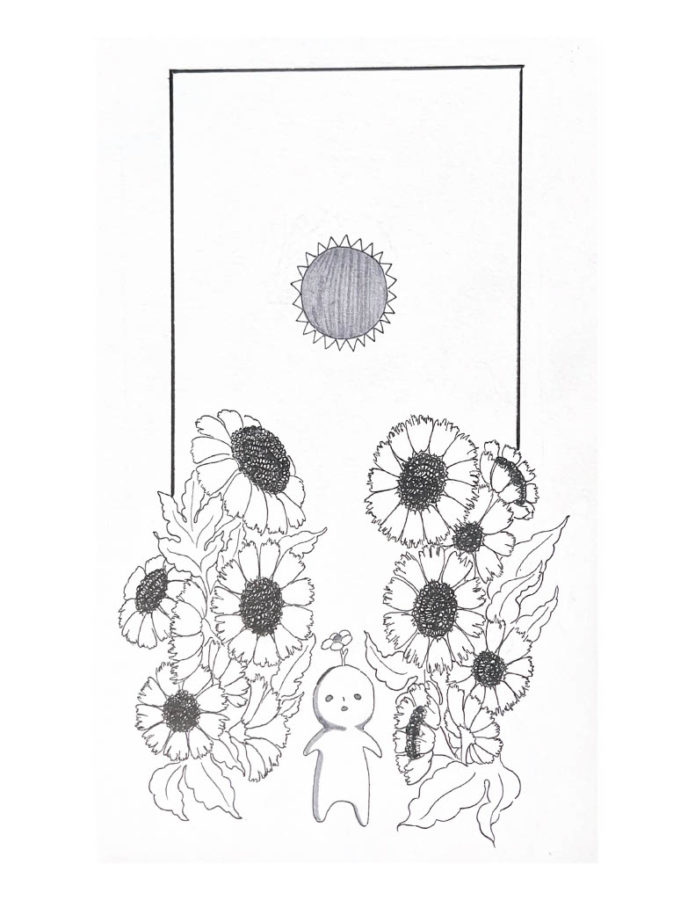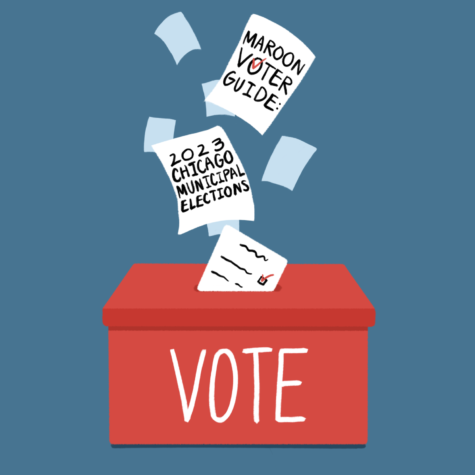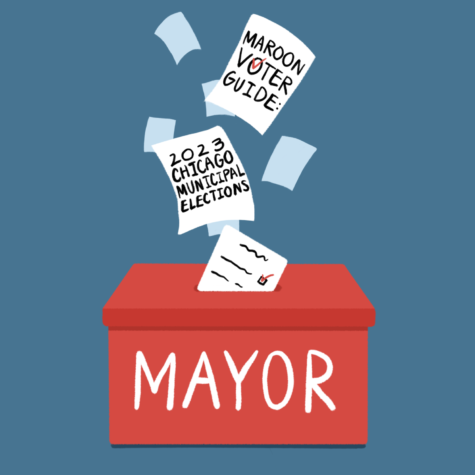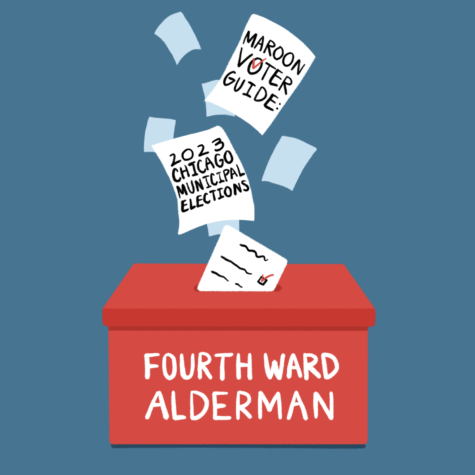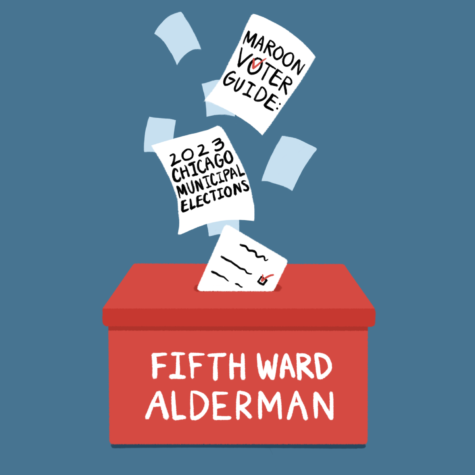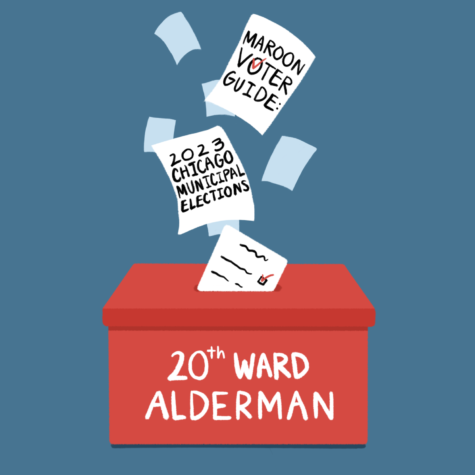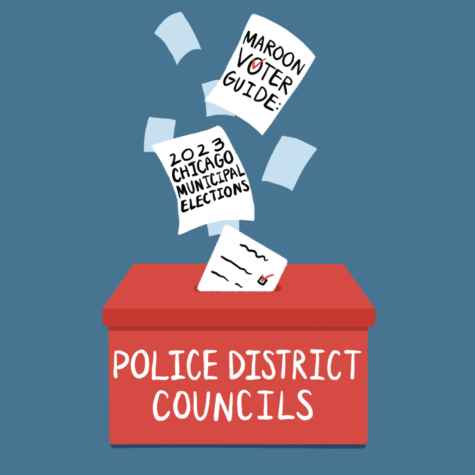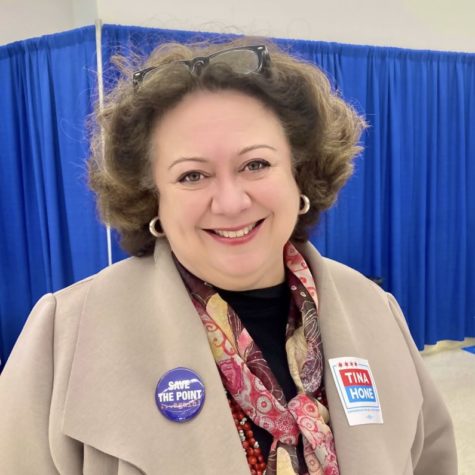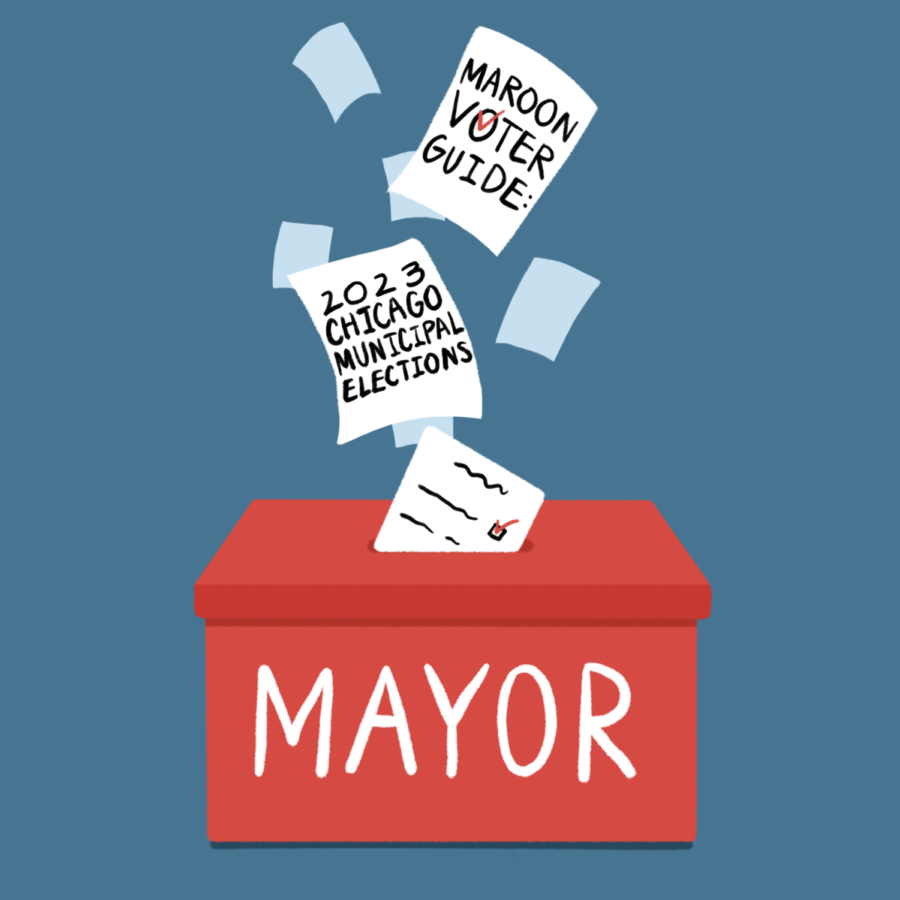Why Student Journalism Matters
College newspapers provides an essential platform for students to engage with their own community and hold power accountable. A free, safe press is necessary to sustain that.
Since second or third year, I’ve been thinking about how I would start this column: my farewell column to my time at not only this university but also this newspaper, without which the former would not be complete. While I could write about how it all started—the conversation I had with a former editor that made it into my speech running for managing editor—or what I learned from the nonstop breaking news cycle or countless production nights, I constantly think back to where it all ended. The day I logged out of The Maroon’s Slack, I also abruptly ended my time in student journalism, a journey so long that I barely knew where to start the recounting.
For four years, I have called myself a student journalist—that’s student first, then a journalist. I stop by Harper in between my classes every other day, stay on campus for RSO events, and occasionally take a Lyft home when it’s too cold. I cram for exams and essays in the Reg during finals week and sometimes spend an indeterminate amount of time at Grounds of Being. But between some variations of this routine, I also cover all of those things as a journalist. While navigating UChicago’s infamous grind culture and a novel, adventurous social life, I also learned to sometimes distance myself from them to report and write about the College experience critically.
In this way, being a student journalist seems like a violation of the first principle of journalistic ethics: Avoid conflicts of interest. This is not the type of obvious conflicts that The Maroon has outlined in its bylaws, such as interviewing a friend or covering an RSO you are in, but the kind that—if you go way, way macro—makes you question a journalist’s relationship with a community that they are so deeply immersed in, where their everyday life is affected by the people and policy they write about in the same way that those quoted in the story are affected too. What does that mean for the job that student journalists do?
For the most part, it is a blessing to cover what we truly love and care about simply by being part of it. Holding the power accountable is a form of that love. We take a pause before writing about a University policy to ask: What does this really mean for the student body? In the same way, we question the administration, local officials, corporations, student leaders in RSOs, and the student government. Regardless of how large these figures are, we know that what they say and what they do will affect the public in some way, hence the readers’ right to know.
During the pandemic, for example, The Maroon broke the news of the University’s decision to switch to remote teaching in March 2020 and continued to cover the University’s COVID-19 policies and track the case updates painstakingly even after the University stopped sending those emails. The Editorial Board kept pushing for transparent and fair policies from the administration during a crisis. Similarly in colleges across the country, student newspapers are often the only source of information for faculty, students, parents, and even community members from the surrounding neighborhood when they are unable to get an answer from the administration. But we don’t do these to expose or criticize: We cover them because we love our community and want to see it become better. And if we don’t cover them or talk to the affected individuals—students who couldn’t get testing, tenants who were forced to leave their homes, residents who were worried about their families—who else will?
But we also do more than simply making information accessible. In The Maroon’s revised constitution, former editor-in-chief Gage Gramlick and I wrote that “truth is easy to assert but hard to capture.” Being transplanted into a place like UChicago, an undeniably huge presence in Hyde Park and the South Side, we all carry a multitude of perspectives and hear the ones that challenge ours. As journalists, we don’t choose to cover the “safe” topics—the ones that our readers like or that drive traffic to our site. We cover uncomfortable debates. We cover controversial topics. We cover, above all, marginalized communities who have traditionally not been given access to the press. That to me is one of the most beautiful assets of student journalism, precisely because student journalists are from the community. And in a college newsroom, we have the freedom to experiment, disagree, and honestly reflect on our past injustices in order to guide future work.
Yet the difficult truth is that student journalists often face inadequate recognition, which means a lack of protection. Journalists, particularly female and BIPOC journalists, have faced increased risks associated with their work, from hate speech to cyberbullying to death threats, industry groups reported. To student journalists, the safety risks are more complicated. As of 2022, only 17 states, including Illinois, have laws protecting student journalists’ First Amendment rights. The law prohibits censorship or self-censorship in the student press. But it does not prevent harassment and threats from reaching the journalists’ inboxes. Unlike professional newsrooms where the institution would step in when its staffers face threats, student newsrooms do not have the capacity to intervene in every single case through means such as blocking hate emails. Seldom do the universities release a statement in cases of an online harassment campaign either.
As student journalists, we have all been told at times that the online mobs will go away when given time. Narratives like these are dangerous because the Internet’s short memory does not undo the harm it has done. When free speech becomes a trade-off with safety, fewer student journalists will be willing to write stories that they deem would lead to repercussions or backlashes, from protests to public safety and even to profiles of online celebrities. Eventually, college newspapers would be forced to choose between writing about the news and protecting their staffers. The result would be detrimental to an equitable community.
Over the past year, I have had many at The Maroon to thank for navigating a hard news cycle amidst the pressure of being a student and a journalist at the same time, in particular the entire executive slate, editorial crew, and the business and production teams. I am especially thankful to the current slate for assuming leadership of the paper from us and achieving remarkable achievements thus far. Now, from one reader to another, I encourage you to continue your support for student journalism, as it remains a vital component in the success of those journalists, despite the challenging circumstances they may face.
Yiwen Lu is a fourth-year in the College and former managing editor of The Chicago Maroon.
Who’s Running for Mayor of Chicago?
Recent polling in a race heavily focused on public safety suggests none of the nine candidates will receive a simple majority, making it likely the top two will compete in an April runoff.
Nine candidates are running to lead Chicago as the next mayor in an election to be held on February 28.
The field includes incumbent Mayor Lori Lightfoot, who is running for a second term. Challenging Lightfoot are activist Ja’Mal Green, Alderman Sophia King, State Representative Kambium “Kam” Buckner, businessman Willie Wilson, Cook County Commissioner Brandon Johnson, former Chicago Public Schools CEO Paul Vallas, Alderman Roderick Sawyer, and U.S. Representative Jesús “Chuy” García.
Chicago’s system requires candidates to receive a simple majority—at least half of the total votes cast—to win. If no candidate receives more than half of all votes cast, the top two candidates proceed to a runoff election on April 4.
Recent polling has shown that no candidate is expected to win a majority, making February’s election likely to be a contest over who makes the runoff. Polls generally show a close race between Lightfoot, Vallas, García, and Johnson for the top two spots.
Lori Lightfoot
Lightfoot is a graduate of the University of Chicago Law School and has served in city government for nearly two decades. Prior to becoming mayor, she was the president of the Chicago Police Board and co-chair of the Chicago Police Accountability Task Force. She was elected in 2019 after receiving 17.5 percent of the vote in the preliminary election and 73.7 percent in the final round. Turnout for both elections in 2019 was 35.45 percent of Chicago’s roughly 1.58 million registered voters.
Lightfoot has spent much of the campaign defending her actions as mayor against attacks from the eight challengers in the race, especially on crime and policing. During a debate hosted by WTTW in early February, several candidates criticized Lightfoot over the Chicago Police Department’s lack of compliance with a 2017 court-ordered consent decree that mandated broad police reforms following an investigation that found significant civil rights violations within the department.
“I appreciate that all these folks want to throw bombs from the cheap seats,” Lightfoot said at the debate. “The fact of the matter is the facts are really clear. We are in compliance or improving our compliance every single day. And this nonsense that you’re hearing from some of these folks is really completely belied by the facts.”
Lightfoot’s website touts raising Chicago’s minimum wage, creating a civilian police oversight board, and attracting $7.9 billion in venture capital investments to the city as her most notable achievements as mayor.
Ja’Mal Green
Ja’Mal Green is a community activist who previously ran as a write-in candidate for mayor in 2019 before endorsing Lightfoot in the runoff. In 2016, Green was arrested while participating in a Black Lives Matter protest. According to his website, he currently runs the My Turn to Own initiative, which he claims has facilitated more than $10 million in mortgages for first-time homeowners. The initiative’s website was not active at the time of publication.
Green’s public safety proposals focus on addressing the root causes of violence and holding police accountable. He proposes giving 10,000 Chicagoans living under the poverty line $1,000 a month and building 10,000 new homes on vacant lots to improve housing affordability. He supports fining police officers who turn off body cameras or obstruct investigations as well as abolishing CPD’s so-called gang database that tracks information on gang activity, including the names of individuals the police believe are affiliated with gangs.
Sophia King
Sophia King is the Fourth Ward alderman on the Chicago City Council, representing a district spanning from the South Loop to northern Hyde Park. King was appointed to City Council in 2016 by then-mayor Rahm Emanuel. Prior to serving on the city council, King helped start Ariel Community Academy, a public school in Kenwood, and was the vice president of Planned Parenthood Chicago. On the city council, King served as the chair of the Progressive Caucus.
King’s campaign has particularly focused on public safety. Her public safety plan criticizes Lightfoot’s city-wide task forces and calls for a community-based approach to policing. King would expand non-police responses to 911 calls related to mental health issues, drugs, or poverty. She supports hiring more police officers and restructuring officer shifts to attract more applicants. The plan would increase the use of technology, including surveillance cameras and drones, to discourage officer pursuits.
Kam Buckner
Buckner is the state representative for Illinois’ 26th district, which spans from River North to South Shore. The district includes most of the University campus and western Hyde Park.
Before being elected to the Illinois House of Representatives in 2020, Buckner worked for U.S. Senator Dick Durbin and led community outreach for the Chicago Cubs. He was appointed to the Illinois House by Governor J. B. Pritzker in 2019 after the previous representative became a deputy governor.
Buckner’s campaign has been focused on public safety, education, economic opportunity, and financial stability. He has pledged to hire more police officers and detectives, recruit officers from the neighborhoods they would serve in, and create an internet intelligence unit to monitor crimes planned online. His education plan calls for social workers and nurses in every public school and affordable housing for every public school student.
Willie Wilson
Willie Wilson is a businessman and a perennial candidate who has previously run for U.S. president, U.S. senate, and mayor of Chicago. This election marks his third time running for mayor. In 2019, Wilson received around 11 percent of the vote.
Wilson previously owned McDonald’s franchises before starting a medical supplies company. He made headlines in 2022 for giving away $2 million in gas and food to people in Chicago and the suburbs.
Wilson’s campaign is focused on lowering crime rates and attracting economic investment. On crime, Wilson proposes splitting the city into four districts, each with its own police superintendent, and supports hiring additional police officers. He also wants to combat poverty and homelessness as well as lower taxes to incentivize businesses to invest in Chicago.
Brandon Johnson
Brandon Johnson represents parts of the West Side and Chicago’s western suburbs on the Cook County Board of Commissioners. He is a former Chicago Public Schools teacher and organizer with the Chicago Teachers Union. Although he has had a relatively short political career compared to other candidates, Johnson has enjoyed strong fundraising support, especially from teachers’ unions.
According to his website, Johnson’s public safety plan focuses on community investment, mental health support, and victim support. Unlike other leading candidates, Johnson does not call for hiring more police officers. Instead, he supports promoting 200 current police officers to detectives to increase the rate at which crimes are solved. On education, Johnson hopes to expand access to childcare, overhaul Chicago Public School funding to make it more equitable, and place more mental health professionals in schools.
Paul Vallas
Paul Vallas is a former education administrator who served as the head of several school districts, including those of Chicago and Philadelphia. He previously launched unsuccessful campaigns for governor, lieutenant governor, and mayor in 2002, 2014, and 2019 respectively. Public opinion polls have consistently placed him among the candidates most likely to reach a possible runoff.
According to his website, Vallas has centered his campaign on improving schools and increasing public safety. He supports opening public schools in the evenings and weekends for student support programs and decentralizing Chicago’s public school system with elected local school councils. On crime, Vallas wants to hire police officers, create a city-operated witness protection program, and replace Police Superintendent David Brown and his leadership team.
Other candidates have attempted to portray Vallas as a more right-wing candidate. Multiple candidates have run advertisements featuring a 2009 interview in which Vallas said he was “more of a Republican than a Democrat now.” Lightfoot criticized Vallas’ acceptance of an endorsement from the Chicago Fraternal Order of Police, Chicago’s police union.
“The bottom line is I’m a lifelong Democrat,” Vallas told ABC7 Chicago in response to the criticism. “I’ve always been a lifelong Democrat. I’ve never taken a Republican ballot.”
Roderick Sawyer
Roderick Sawyer currently serves as the alderman for Chicago’s Sixth Ward, which spans from South Loop to Fuller Park. He was first elected to the city council in 2011. Sawyer is the son of former Chicago mayor Eugene Sawyer.
According to his website, Sawyer is most focused on public safety and economic development. His public safety plan calls for hiring 1,000 additional police officers and allowing retired officers to be rehired for responses to non-emergency 911 calls. Sawyer also proposes several measures designed to attract more officer applicants, including easier hours, better pensions, and career development training. Sawyer’s economic development proposal calls for expanded loan programs to develop vacant lots for small businesses and affordable housing.
Chuy García
García is the U.S. representative for Illinois’ fourth congressional district, which includes much of the West Side and parts of the western suburbs. García began his political career in 1984 as a committeeman in the Cook County Democratic Party. Since then, he has served in the Chicago City Council, Illinois State Senate, and Cook County Board of Commissioners. He unsuccessfully ran for mayor against then incumbent Rahm Emanuel in 2015, coming in second place with nearly 44 percent of the vote in the runoff.
Like other candidates, García has emphasized public safety in his campaign. He calls for replacing the Chicago Police Department’s leadership, sending civilian teams instead of police to mental health calls, and investing in community violence prevention. In the plan, he claims Lightfoot’s more combative approach to politics has prevented constructive collaboration between public safety agencies.
